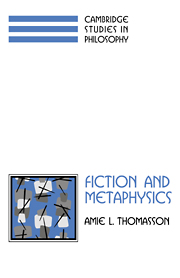Book contents
- Frontmatter
- Contents
- Acknowledgments
- Introduction: From Fiction Into Metaphysics
- Part One The Artifactual Theory of Fiction
- Part Two Ontological decisions
- Foreword
- 6 Fiction and experience
- 7 Fiction and language
- 8 Ontology and categorization
- 9 Perils of false parsimony
- 10 Ontology for a varied world
- Notes
- Bibliography
- Index
Foreword
Published online by Cambridge University Press: 23 September 2009
- Frontmatter
- Contents
- Acknowledgments
- Introduction: From Fiction Into Metaphysics
- Part One The Artifactual Theory of Fiction
- Part Two Ontological decisions
- Foreword
- 6 Fiction and experience
- 7 Fiction and language
- 8 Ontology and categorization
- 9 Perils of false parsimony
- 10 Ontology for a varied world
- Notes
- Bibliography
- Index
Summary
In Part One I argue that we should consider fictional characters not to be the strange occupants of another realm but rather as abstract cultural artifacts as ordinary as the works of literature in which they appear. If we do so, then the problems that arise for fictional characters, including how to refer to them and offer identity conditions for them, parallel problems for other abstract entities and cultural artifacts. I have attempted to show how these problems may be overcome by considering fictional characters to be dependent entities, thus removing two major stumbling blocks to postulating fictional characters and suggesting ways to overcome these problems for other dependent abstracta. But so far this merely eliminates reasons not to postulate fictional characters and does not provide us with any positive reason to postulate them.
It is now time to face the second question: Should we admit fictional characters into our ontology? The case of fictional characters provides occasion for reexamining the larger issue: What, in general, should we admit to our ontology, and on what grounds? One of the points of philosophy in general, and ontology more particularly, is to help us make sense of our world. Thus one goal in choosing an ontology is to select one that provides an adequate basis for understanding our experience of and discourse about the world. Naturally this does not mean that we can never determine that experiences are misleading, discourse fallacious, or practice in need of revision. It only requires that we seek a theory able to analyze what our experience is about and whether our sentences are true or false as consistently, adequately, and elegantly as possible overall.
- Type
- Chapter
- Information
- Fiction and Metaphysics , pp. 73 - 75Publisher: Cambridge University PressPrint publication year: 1998

